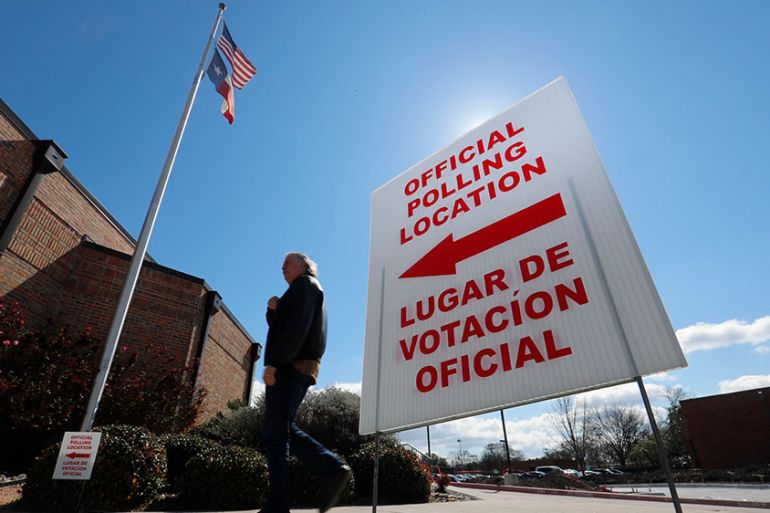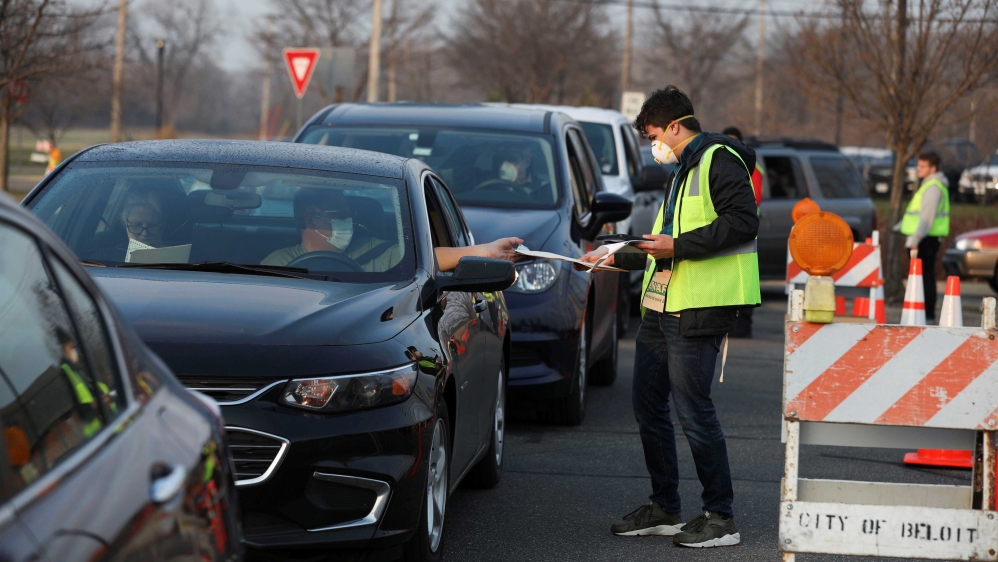Battle over voting by mail upends US’s ‘coronavirus election’
Voting rights advocates believe the pandemic will significantly impact how many people turn out in upcoming elections.

For outside observers of United States politics, it’s a genuinely baffling question: Why would anyone be opposed to higher participation in elections?
For partisan players in the process, however, the question and the issues underlying it mark the next big battle now that the fight over who will challenge President Donald Trump in the November general election has been all but settled.
Keep reading
list of 3 itemsCoronavirus: Why are deaths rising so quickly in Spain?
Timeline: How the new coronavirus spread
The battle – over making absentee voting, or voting by mail, easier in the US – has been simmering for years but has taken on new urgency in the age of the coronavirus. Voting rights advocates believe the pandemic could have a significant impact on how many people turn out in hundreds of upcoming elections across the country, including the White House contest.
Congressional Democrats want to dramatically expand voters’ ability to cast ballots remotely, arguing that forcing people to vote in person during a contagion is reckless and dangerous. Millions would likely skip out on voting altogether rather than take the risk, they say, eroding confidence in the legitimacy of the elections themselves.
“Why should we be saying to people, ‘Stand in line for hours,’ when we don’t even want you leaving the house?” Democratic House Speaker Nancy Pelosi said on Thursday.
Currently, only five states send ballots to all voters to be returned through the mail. About a third of states require an excuse to get an absentee ballot, and some require a witness to sign an application for a mail ballot – a requirement that can be difficult to meet for voters under lockdown.

Democrats attempted to mandate nationwide, no-excuse mail-in voting in the coronavirus stimulus package passed by Congress earlier this month, but the measure was removed following Republican opposition. House leaders did manage to secure $400m in funding for local election offices, but they estimate that at least $1.6bn more would be needed to enable the states to prepare for a radically changed voting landscape in November.
On Wednesday, New York Governor Andrew Cuomo issued an executive order that would allow voting by mail in that hard-hit state’s upcoming primary election, which was postponed from April to June, without an excuse for the first time. “New Yorkers shouldn’t have to choose between their health and their civic duty,” Cuomo tweeted.
But New York is so far an outlier. Democrats in Texas have filed a lawsuit seeking to allow the pandemic to qualify as a legitimate excuse for any voter seeking an absentee ballot, and Democratic activists say they expect many more such lawsuits in the coming weeks.
“We have already seen more litigation, even before COVID, than ever before in 2020,” Marc Elias, a lawyer who represents the Democratic Party on voting issues, told the Associated Press news agency. “What COVID has done is added fuel to that fire.”
Republican opposition to the plan revolves around allegations that voting by mail is rife with fraud. Trump has even suggested – without evidence – that higher turnout tamps down the electoral odds of Republicans, and he has taken to Twitter repeatedly in recent days to try and shut down the efforts.
Absentee Ballots are a great way to vote for the many senior citizens, military, and others who can’t get to the polls on Election Day. These ballots are very different from 100% Mail-In Voting, which is “RIPE for FRAUD,” and shouldn’t be allowed!
— Donald J. Trump (@realDonaldTrump) April 8, 2020
Indeed, there has been fraud associated with absentee balloting in the past. Most famously, President Lyndon Johnson was elected to the US Senate in Texas in 1948 on the back of fraudulent absentee votes from South Texas. More recently, in 2019, an operative for a Republican congressional candidate in North Carolina was indicted for buying and illegally filling out absentee ballots.
Ballot harvesting, or allowing someone to return a ballot on behalf of another voter or group of voters, is one of the thorniest issues in the current debate. Democrats believe the option, currently allowed in 24 states, is essential for elderly voters and others isolated by the pandemic. Republicans, however, are adamantly opposed, and have set aside $10m to fight Democratic lawsuits related to the virus.
|
|
Stan Veuger, a scholar at the conservative American Enterprise Institute in Washington, DC who has studied vote-by-mail systems in states like Oregon, says Republican concerns about ballot harvesting are reasonable. “On the other hand,” he told Al Jazeera, “one person’s ballot harvesting is another person’s effective campaigning.”
Veuger says the system used in Oregon, which has been voting by mail exclusively since 1998 – while not perfect – is wildly popular and has not affected overall turnout. And contrary to the assertions of Trump and other Republicans, there is little evidence that voting by mail impacts who or what party people support at the polls.
Any disadvantages to voting by mail, Veuger says, are easily outweighed by the serious risk to the US system of government if in-person voting is the only method available during a renewed coronavirus outbreak.
“The key takeaway from this is that voting by mail is both safe and cheap,” Veuger said. “Especially if the federal government picks up the tab for the transition, it is an excellent system to have even if only as a backup.”
